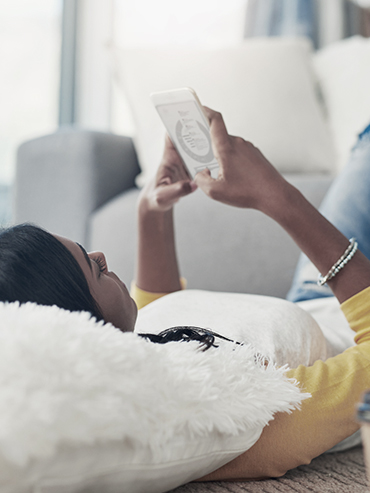I’m Sick of Seeing Memes About Anxiety Attacks
Yes, laughter can help break the stigma, but is there a point at which the normalization of mental health goes too far?


It was a freezing day in early January and I was standing outside of my office in jeans and a blouse. Out of nowhere, my anxiety had spiked and I desperately needed fresh air. My heart was in my throat, I was having a hard time catching my breath and I couldn’t think about anything except trying to slow it all down. After doing a few grounding techniques, I finally calmed down enough to head back inside. That’s when I opened Instagram to see an influencer complaining about *her* anxiety… over which bathing suits to bring on vacation.
I was diagnosed with Generalized Anxiety Disorder six months ago (after a year of trying to deal with it on my own). GAD often makes it hard to concentrate during the day and to sleep at night. It causes irritability, shortness of breath and excessive worrying—about everything and everyone. A lot of the symptoms are physical, like a racing heartbeat and constant fatigue. (Coffee is both my best friend and worst enemy.) The causes of GAD can range from genetics to certain personality traits to post traumatic stress.
I’m not sure if I would have ever sought help for my mental health if it weren’t for the current widespread movement towards de-stigmatizing mental illness. Because of various wellness campaigns and countless celebrities opening up about their own struggles, I feel empowered enough to go to therapy, take daily medication and explore my personal struggle publicly. (Yes, hi!) With designated awareness periods, campaigns like Bell Let’s Talk and the abundance of mental health resources online, this conversation has become easier to have than ever before.
But also thanks to this movement, we’ve reached a point where mental illness has, in some ways, become a fad. The trivialization of issues like anxiety frustrates me—and it did long before I had an official diagnosis. From popular memes about dealing with depression and anxiety (which, I would argue, are actually just descriptions of general stresses and inconveniences…) to the way we throw around terms like “OCD” and “bipolar” in everyday conversation, maybe it’s time we re-evaluate just how easy-breezy we are about mental illness.
Depression vs anxiety pic.twitter.com/kTO9aaFeOU
— Jon Christian (@Jon_Christian) May 5, 2019
When normalization goes too far
According to a CAMH study from 2015, 57 percent of Canadians thought stigma around mental illness had lessened from five years prior, and 81% said they had more mental health awareness than they did in 2010. (But that’s not to say that stigma has been eliminated completely. Sixty-four percent of those respondents would still worry about how their work would be affected if a colleague had a mental illness.) While this progress is great, there’s a point at which our openness about mental health can be detrimental.
“Of course, normalization is super important because these illnesses are very common. But I think that there’s almost been an over-normalization,” says Toronto-based psychotherapist Taryn Motosune. “When we’re kind of saying, ‘Oh yeah everyone has this, everyone’s experiencing that,’ it can deter people from reaching out and getting help.” Because at the end of the day, if it seems like *everyone* is going through the same thing, then maybe it’s not really a problem, right?
The day I had that anxiety episode at work, I tweeted my annoyance with this widespread flippant self-diagnosis of mental disorders—and turns out a lot of people could relate to my frustration.
Lol "having anxiety" is not another term for "feeling super nervous about something." Our generation is accustomed to diminishing real disorders for the sake of trendiness and it's not cool ok thank you and goodbye
— ebony-renee (@ebonyreneebaker) January 8, 2019
One friend said that she’s often told she’s just being “dramatic” when she says she’s having an anxiety attack. And another pointed out that it bothers her when people use terms like “OCD” to exaggerate common habits, like making really detailed plans or organizing your closet by colour.
It’s hard to see so many people co-opting illnesses for likes and attention. This idea of having a personal struggle while still seeming busy, important and unbothered has become modern-day martyrdom—like, you’re not successful if you don’t deal with an invisible illness along way.
https://www.instagram.com/p/Bx3x77eBKZj/?igshid=2lt0126c5qs0
But JSYK, feeling anxious is different from having an actual diagnosed condition. “When people say things like, ‘She’s so bipolar’ or ‘I’m so OCD’ because they have just a dash of one those characteristics, it’s reducing a very serious and often debilitating health condition into a quirk,” Motosune says. And on social media these days, quirks = clout.
“If people minimize or mock mental illness, and if some people are interpreting the memes to be doing that, it creates more stigma and again can deter people from seeking help,” she continues. What these memes are doing is creating a misunderstanding of what mental illnesses really are—to the point where the real, uncomfortable symptoms that these memes *don’t* show are even more alienated.
Humour *can* help, but we still need to take illness seriously
To be clear, my issue with these jokes is not that they’re making fun of mental illness. In fact, dark humour has been proven to help those who are suffering. For example, Maddie, 28, is someone who struggles with anxiety, depression, ADHD and OCD. These illnesses led to her taking a break from university, they have cost her jobs and generally make it difficult for her to even walk down the street. But she says she loves seeing memes that shed light on her own illnesses—they make her feel less alone.
“I think that [they’re] a great way for people to express [their issues] because it uses humour. I don’t think that trivializes it—it’s relatable and lets people know that they’re not alone.”
But what I do find problematic is that these memes are encouraging everyone to proclaim their own disorders, even if they don’t actually suffer from anything serious, because it’s cool to relate. To add to that, they can also pressure people with real illnesses to feel like they have to share their struggles online, too. Unfortunately, being open about something like that can still alienate people from those they are close with—or make them feel like they are overreacting. The fact is that, despite our progress, there still are people who don’t believe mental illnesses exist, or don’t understand them, and it’s possible that those you confide in could react with ignorance or insensitivity. (Trust, I’ve been there.) So how much is too much when it comes to “innocent” social media jokes?
The real-life impacts of fetishization
In an essay on Medium, writer Matt Klein points out that, “when mental illness becomes fetishized, its significance becomes trivialized, and we regress to where we once started — not giving the topic the appropriate attention it deserves.” We need to take mental illness seriously so that those dealing with mental illness know that it’s OK to get help, and it’s OK to medicate. We need accommodating workplaces, schools and environments now more than ever, seeing as cases of mental illness continue to rise among young people.
For Maddie, those accommodating spaces could make all the difference—she’s been laid off in the past as a direct result of her mental illnesses. “Like a lot of people with ADHD, I’ve been let go, and it’s not so much the quality of my work, but it’s about attendance. Chronic lateness is something that I’ve had since I was in middle school,” she says. While ADHD can affect people in different ways, some common symptoms can include disorganization and poor time management skills.
In my case, working in an environment where my colleagues and I speak freely about mental health plays a huge part in being able to deal with my anxiety, like I did on that cold winter day. Had my colleagues questioned my need to get space, or forced me to continue participating fully for the rest of the day, I can only imagine my anxiety would’ve gotten worse. If I were never given the option to leave work early when my anxiety became too much, I wouldn’t have seen my career progress in the ways it has. But this is a privilege and not the norm.
So, before you make a joke about being bipolar or depressed for some minuscule reason, remember, not only is that inaccurate, but it diminishes the symptoms of real mental illnesses. After all, even the tiniest bit of support might help someone who’s having intense anxiety in the middle of the work day to feel that those difficult, personal moments are real, and validated. That maybe it’s OK just to take their medication or go to their therapist… and not have to share it with the entire world.
Related:
I Don’t Think We’re *Actually* Dealing with the Trauma We See on Social Media
Running Is Great for Your Mood—But What If You Literally Can’t Get Off the Couch?
Where to Find Affordable & Accessible Mental Health Care Across Canada








